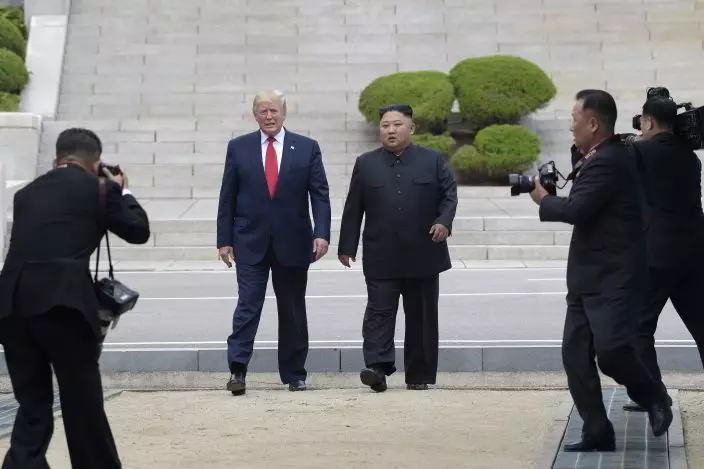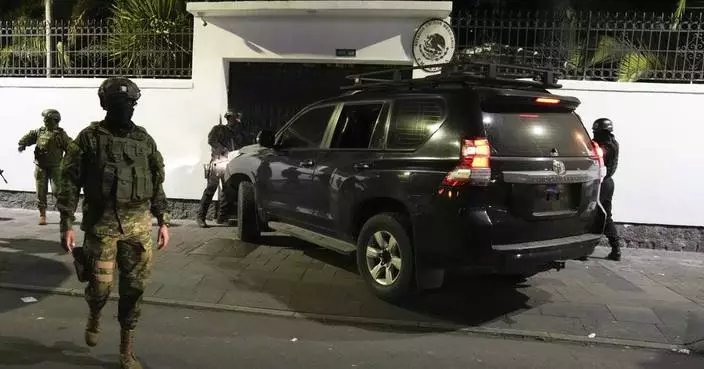Three days after the U.S. and North Korean leaders held a historic third meeting, North Korea's U.N. Mission accused the Trump administration Wednesday of talking about dialogue but being "more and more hell bent" on hostile acts.
A press statement from the mission pointed a finger at U.S. efforts to exert "overt pressure" and have the world's nations implement U.N. sanctions.
First, it said, the U.S. and 23 other countries sent a letter to the U.N. Security Council committee monitoring sanctions on North Korea demanding urgent action "under the absurd pretext of 'excess in the amount of refined petroleum imported.'"

FILE - In this June 30, 2019, file photo, President Donald Trump, center left, and North Korean leader Kim Jong Un walk on the North Korean side at the border village of Panmunjom in the Demilitarized Zone. South Korea's President Moon Jae-in calls the recent U.S.-North Korean summit at the Korean border an end of mutual hostility between the countries. (AP PhotoSusan Walsh, File)
The United States and the other countries accused the Democratic People's Republic of North Korea, or DPRK, of violating U.N. sanctions by importing far more than the annual limit of 500,000 barrels of refined petroleum products, which are key for its economy. But last month Russia and China blocked the sanctions committee from declaring that Pyongyang breached the annual import limit.
North Korea's U.N. Mission said the United States, Britain, France and Germany then circulated a joint letter to all U.N. member states on June 29 "calling for repatriation of the DPRK workers abroad, thus inciting an atmosphere of sanctions and pressure against the DPRK."
It added that not only does this speak "to the reality that the United States is practically more and more hell-bent on the hostile acts against the DPRK, though talking about the DPRK-U.S. dialogue," but the letter was sent by the U.S. Mission "under the instruction of the State Department, on the very same day when President (Donald) Trump proposed for the summit meeting."
That day, Trump issued an unprecedented invitation to meet with North Korean leader Kim Jong Un at the Demilitarized Zone between the two Koreas. Kim accepted and at their Sunday meeting, Trump became the first sitting U.S. president to set foot in North Korea when he crossed the demarcation line.
Trump and Kim agreed at the meeting to restart negotiations designed to denuclearize the Korean peninsula. North Korea's state media described their meeting as "an amazing event."
But there was nothing positive in Wednesday's statement from North Korea's U.N. Mission, which made no mention of nuclear talks, focusing instead on sanctions.
The U.N. Security Council imposed increasingly tough sanctions on North Korea in response to its nuclear bomb and ballistic missile tests. The sanctions are designed to cut off all North Korean exports, 90 percent of its trade, and disband its pool of workers send abroad to earn hard currency.
Despite the summits between Trump and Kim in Singapore and Hanoi, the United States has kept up pressure on countries to implement the sanctions — and on North Korea to abide by them.
"It is quite ridiculous for the United States to continue to behave obsessed with sanctions and pressure campaign against the DPRK, considering sanctions as a panacea for all problems," North Korea's mission said. "As we stated on several occasions, we do not thirst for lifting of sanctions."
The North Korean Mission also had a message for the other 192 U.N. member nations.
"All U.N. member states will have to keep vigilance against deliberate attempts by the United States to undermine the peaceful atmosphere that has been created on the Korean peninsula in no easy way," the mission said.
UNITED NATIONS (AP) — The world hasn’t seen anything like the unprecedented destruction of housing in Gaza since World War II, and it would take at least until 2040 to restore the homes devastated in Israel’s bombing and ground offensive if the conflict ended today, the United Nations reported Thursday.
The U.N. assessment said the social and economic impact of the war launched after Hamas’ surprise attack in southern Israel on Oct. 7 has been increasing “in an exponential manner.”
It called the level of casualties – 5% of Gaza’s 2.3 million population -- “unprecedented” in such a short time. By mid-April, it said, over 33,000 Palestinians had been killed and more than 80,000 injured. About 7,000 others remain missing, most believed to be buried under the rubble.
“Every additional day that this war continues is exacting huge and compounding costs to Gazans and all Palestinians” said United Nations Development Program Administrator Achim Steiner.
The report by UNDP and the U.N. Economic Commission for Western Asia paints a dire picture of the struggle to survive in Gaza where 201,000 jobs have been lost since the war began and the economy contracted 81% in the last quarter of 2023.
Abdallah Al Dardari, UNDP’s regional director for Arab states, told a U.N. press conference launching the report that almost $50 billion in investments in Gaza are estimated to have been wiped out in the conflict, and 1.8 million Palestinians have fallen into poverty.
Gaza has been under blockade by Israel and Egypt since Hamas’ 2007 takeover, putting tight controls on what enters and exits the territory. Even before the war, it faced “hyper-unemployment” of 45%, reaching nearly 63% among younger workers.
According to the report, the U.N. Human Development Index – which measures key issues for a long and healthy life, for gaining knowledge and for achieving a decent standard of living – has been pushed back more than 20 years in Gaza.
The “productive basis of the economy has been destroyed,” the report said, with sectors experiencing losses of more than 90%. It estimated that the GDP of Gaza could decrease by 51% in 2024.
“The scope and scale of damages have been unprecedented and still mounting as the war still rages on,” it said.
At least 370,000 housing units in Gaza have been damaged, including 79,000 destroyed completely, the report said, along with commercial buildings.
After previous Israel-Hamas conflicts, housing was rebuilt at a rate of 992 units a year, it said. Even if Israel allows a five-fold increase of construction material to enter Gaza, it would take until 2040 to rebuild the destroyed houses, without repairing the damaged ones.
Al Dardari said that after 51 days of fighting between Israel and Hamas in 2014 there were 2.4 million tons of debris in Gaza. In the current war, he said, there are already 37 tons of debris that need to be removed to make space for temporary shelters and other structures which are critical to return some sort of normalcy to Palestinians in Gaza.
“We haven't seen anything like this since 1945, since the Second World War — that intensity in such a short time, and the massive scale of destruction,” he said.
Al Dardari said the preliminary estimate of the cost of an early recovery program for three years, which would bring hundreds of thousands of Palestinians back to temporary shelters in their original locations with community support, is between $2 billion and $3 billion.
The rough estimate for the overall reconstruction of Gaza is between $40 billion and $50 billion, he said.
But Al Dardari stressed that the immediate focus now is on planning for early recovery.
He said the U.N. senior humanitarian and reconstruction coordinator for Gaza, Sigrid Kaag, and other officials met earlier Thursday with 22 U.N. agencies and went through plans by each one for the initial years after the war ends.
“We are on the verge of developing and finalizing a unified view and early recovery framework that is Palestinian-centered, Palestinian-led and owned by the Palestinian people,” Al Dardari said.
Associated Press Writer Lee Keath contributed to this report from Cairo

The unprecedented destruction of housing in Gaza hasn't been seen since World War II, the UN says

The unprecedented destruction of housing in Gaza hasn't been seen since World War II, the UN says

Palestinians look at the destruction after an Israeli airstrike in Deir al Balah, Gaza Strip, Tuesday, April 30, 2024. (AP Photo/Abdel Kareem Hana)













